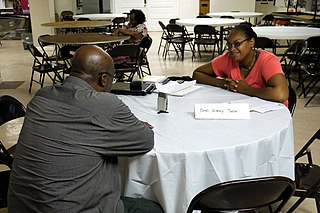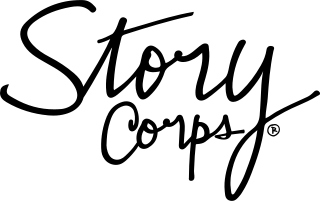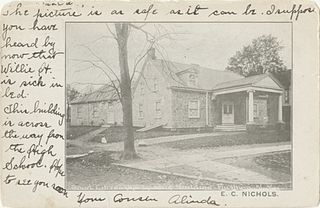
Oral history is the collection and study of historical information about individuals, families, important events, or everyday life using audiotapes, videotapes, or transcriptions of planned interviews. These interviews are conducted with people who participated in or observed past events and whose memories and perceptions of these are to be preserved as an aural record for future generations. Oral history strives to obtain information from different perspectives and most of these cannot be found in written sources. Oral history also refers to information gathered in this manner and to a written work based on such data, often preserved in archives and large libraries. Knowledge presented by Oral History (OH) is unique in that it shares the tacit perspective, thoughts, opinions and understanding of the interviewee in its primary form.
Historica Canada is Canada's largest organization dedicated to enhancing awareness of the country's history and citizenship. All of its programs are offered bilingually and reach more than 28 million Canadians annually.

Leah Lakshmi Piepzna-Samarasinha is an American poet, writer, educator and social activist. Their writing and performance art focuses on documenting the stories of queer and trans people of color, abuse survivors, mixed-race people and diasporic South Asians and Sri Lankans. A central concern of their work is the interconnection of systems of colonialism, abuse and violence.
Virginia Humanities (VH), formerly the Virginia Foundation for the Humanities, is a humanities council whose stated mission is to develop the civic, cultural, and intellectual life of the Commonwealth of Virginia by creating learning opportunities for all Virginians. VH aims to bring the humanities fully into Virginia's public life, assisting individuals and communities in their efforts to understand the past, confront important issues in the present, and shape a promising future.
The Transgender Oral History Project is an initiative by and for the transgender community. TOHP collects interviews and produces multimedia content featuring stories of transgender-identified people, and exists to empower trans folks through sharing stories of their lives. The Transgender Oral History Project is also active in the community, hosting events in many states including Massachusetts, Illinois, Iowa, Seattle, Philadelphia, and New York City.

Disability in the arts is an aspect within various arts disciplines of inclusive practices involving disability. It manifests itself in the output and mission of some stage and modern dance performing-arts companies, and as the subject matter of individual works of art, such as the work of specific painters and those who draw.
The physically integrated dance movement is part of the disability culture movement, which recognizes and celebrates the first-person experience of disability, not as a medical model construct but as a social phenomenon, through artistic, literary, and other creative means.

StoryCorps is an American non-profit organization whose mission is to record, preserve, and share the stories of Americans from all backgrounds and beliefs. StoryCorps grew out of Sound Portraits Productions as a project founded in 2003 by radio producer David Isay. Its headquarters are located in the Fort Greene neighborhood of Brooklyn, New York.

The Queens Memory Project is a community archiving program which aims to record and preserve contemporary history across the New York City borough of Queens. Community archives are created in response to needs defined by the members of a community, who may also exert control over how materials are used. The project is a collaborative effort between Queens College, City University of New York and Queens Public Library that was initially funded in 2010 through a grant from the Metropolitan New York Library Council (METRO). Materials in the archive are made accessible to the public through a website which contains oral history interviews and photographs documenting the lives of Queens residents. The stories and images are presented alongside digitized historical photographs, maps, news clippings and other archival records. The goal of the project is to allow visitors to the site to view otherwise scattered archival materials and personal stories in a searchable database of collective memory representing the borough of Queens.
Neil Marcus was an actor and playwright active in the development of disability culture, who has reshaped ways of thinking about disability.

The Samuel Proctor Oral History Program (SPOHP) is the official oral history program at the University of Florida. With over 6,500 interviews and more than 150,000 pages of transcribed material, it is one of the premier oral history programs in the United States. SPOHP's mission is "to gather, preserve, and promote living histories of individuals from all walks of life." The program involves staff, undergraduate and graduate students, and community volunteers in its operation.
Family folklore is the branch of folkloristics concerned with the study and use of folklore and traditional culture transmitted within an individual family group. This includes craft goods produced by family members or memorabilia that have been saved as reminders of family events. It includes family photos, photo albums, along with bundles of other pages held for posterity such as certificates, letters, journals, notes, and shopping lists. Family sayings and stories which recount true events are retold as a means of maintaining a common family identity. Family customs are performed, modified, sometimes forgotten, created or resurrected with great frequency. Each time the result is to define and solidify the perception of the family as unique.
Sins Invalid is a disability justice-based performance project that incubates artists with disabilities, centralizing artists of color and LGBTQ / gender-variant artists. Led by disabled people of color, Sins Invalid's performance work explores the themes of sexuality, embodiment and the disabled body. In addition to multidisciplinary performances by people with disabilities, Sins Invalid organizes visual art exhibits, readings, and a bi-monthly educational video series. Sins Invalid collaborates with other movement-building projects and provides disability justice trainings.

Alice Wong is a disability rights activist based in San Francisco, California.

Uncanny Magazine is an American science fiction and fantasy online magazine, edited and published by Lynne M. Thomas and Michael Damian Thomas, based in Urbana, Illinois. Its mascot is a space unicorn.

Singapore does not have a formal definition of disability, but has been making changes in regards to the visibility of people with disability and also with increasing accessibility of all areas of the country. Early in the country's history, human rights issues for people with disabilities took second place to the need to secure independence and building the economy. Singapore signed on to the Convention on the Rights of Persons with Disabilities (UNCRPD) in 2013 and coordinates the Enabling Masterplan with both government and non governmental organisations.
Shain Mahaffey Neumeier is an American autistic and nonbinary transgender attorney from Los Angeles, California. Neumeier advocates against coercive and forced treatment, including advocacy to close the Judge Rotenberg Center, an institution for people with developmental disabilities that has been condemned by the United Nations for torture due to its use of electric shock aversion therapy on people with disabilities. They are also an activist for autism rights, disability rights, youth liberation, asexuality, and transgender rights. Neumeier has multiple disabilities including post-traumatic stress disorder, cleft lip and palate, ectodermal dysplasia, and depression.
Mia Mingus is an American writer, educator, and community organizer who focuses on issues of disability justice. She is known for coining the term "access intimacy". She advocates for disability studies and activism to centralize the experiences of marginalized people within disability organizing. She is a prison abolitionist, and she advocates for transformative justice in her work against child sexual abuse.

Paul Darke CF is a British academic, artist, filmmaker, podcaster and disability rights activist. Darke is an expert on disability in film and politics.
Stephanie Thomas is an American disability fashion stylist, creative director, public speaker, voice actor, author, and professor. In 2006 she coined the phrase "Why are there more in-store clothing options for pets than there are for people with disabilities?". In 2019, Thomas made the Business of Fashion BOF 500 list of People Shaping the Global Fashion Industry.










